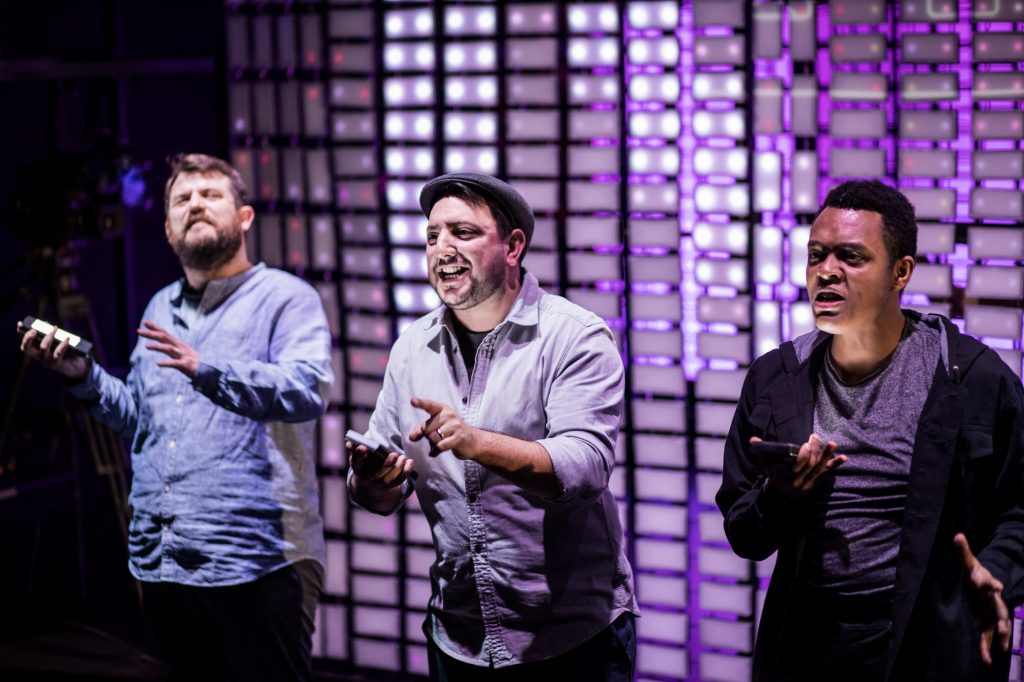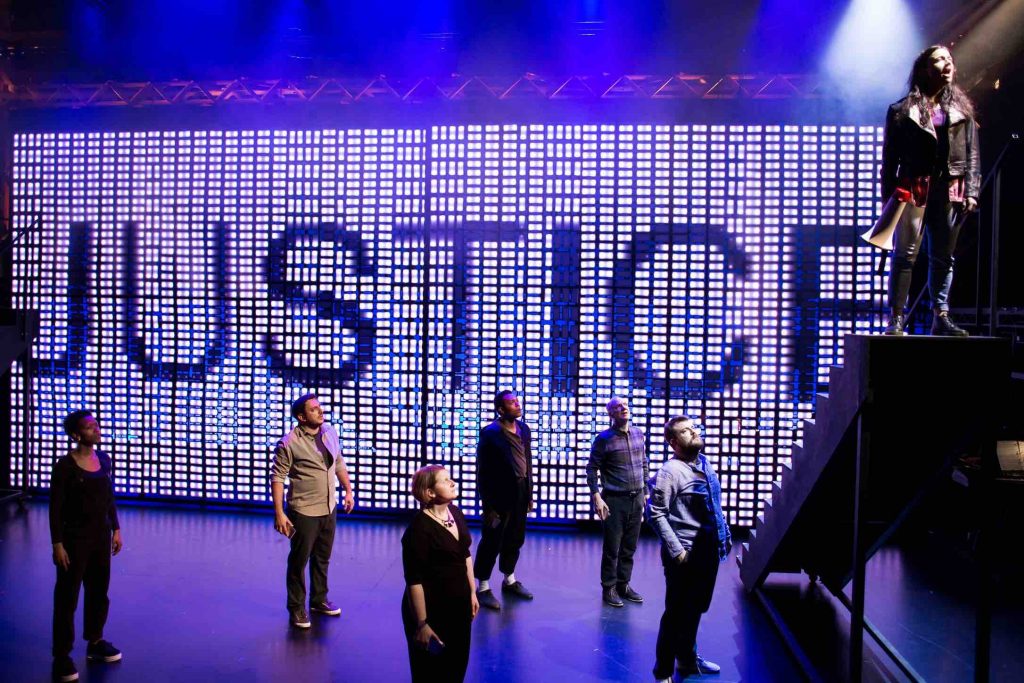Everybody has an opinion these days. Some people are paid to have opinions professionally. But what about all the people who have opinions that nobody asked for? Are they still valid? Do people still want to hear them? Do people need to hear them?
The truth is, everybody’s opinion is valid, but not every opinion is welcome. Social media allows the individual to speak to the masses at the touch of a button, and they can put as much or as little thought and research into that opinion as they like.
This frenetic new musical, written by Chris Bush and composed by Matt Winkworth, attempts to open up the national debate about freedom of speech, and whether what’s called “hate speech” should be just as free as all the self-congratulatory back-patting and celebrity worship that happens online. For every tweet simpering over the birth of a new #royalbaby, there’s another slamming the Duchess of Cambridge for looking too glamorous just hours after giving birth. For every #BlackPower hashtag, there’s a thread bemoaning the loss of Little England and what it means to be British (and white).
Controversial right-wing journalist and social commentator Katie Hopkins is dead. In June 2018 (not far away now), she was assassinated while attending a media awards junket in London, and this is the trigger point for a sprawling play which takes free speech, and the right to have it, as its talking point. There’s been lots of controversy surrounding The Assassination of Katie Hopkins because the title is understandably inflammatory (especially if you’re called Katie Hopkins). But unless you’ve actually seen the production, you’re hardly best placed to have an opinion on it. It doesn’t stop people having one though…
With the assassination of such a high-profile, outspoken figure, Bush’s story imagines what would happen to Britain in the aftermath. Bush imagines there might be public memorial services, attended by high-profile politicians, including the Prime Minister. She imagines that splenetic radio talk show hosts will chase sensation by mocking left-wingers who want to say Hopkins “had it coming”, but are too afraid to say it. And she imagines that people in the street will generally feel sad that she’s gone, because she dared to have an unpopular opinion, to “say the unsayable”.
The entire production is quite flattering for Hopkins, and I’m pretty sure that if she ever actually went to see it, she’d be proud of how her legacy is portrayed. Plenty of time is taken to express the right-wing point of view, becoming an apologist for Hopkins.
Winkworth’s music is wonderfully modern and energetic, incorporating those awful mobile phone alert sounds we live with every day but barely notice, synthesising them into vibrant melodies thanks to a live band led by musical director Jordan Li-Smith. The stand-out song is Have You Seen This?, which opens the play and runs throughout as a touchstone, most amusingly near the end when a human rights lawyer is trying to launch her British Justice campaign at a press conference, but onlookers and reporters are distracted by something else happening somewhere else, right now… Breaking news! “Have you seen this…?” they say, pointing to their phones and wandering away. It’s like a national choreography.
Lucy Osborne’s set is functionally sparse, one of gantries and steps, but dominated by two sliding screens made up of thousands of makeshift smartphones which display a myriad of colours, lights and projections. It’s clever to have a projection screen made up of phones, but if you’re sitting too close to them (which is likely in Theatr Clwyd’s Emlyn Williams studio space), the detail can be lost. The stage management is a little haphazard at times too – for how many years have musicals been rolling flights of stairs around the stage to generate movement? It’s a slightly hackneyed choice for what is supposed to be an ultra-modern musical.
And it really doesn’t help the flow of the piece when you’ve got people uncoupling the brakes on moveable stairs – CLANK! CLANK! – while somebody else is trying to sing. The moment where a random stagehand walked from right to left across the stage in stark silhouette was unnecessarily distracting. The sparsity of the set exposes the inner workings of the production, making you look at things that distract you from the breakneck narrative.
Director James Grieve comes up with the refreshing idea of having the actors conduct rolling news reports, YouTube videos and Periscope broadcasts live on stage (complete with screen freezes!). Cameras follow the performers around, with the broadcasts projected onto the big screen, giving the audience the choice of watching the live performers or the finished transmission simultaneously. The immediacy of this element of the production gives an added layer to the regular live theatre experience and is the perfect expression of the modern world, as it happens, on the stage.
The cast is a talented bunch too, particularly Matthew Woodyatt, whose voice soars like a baritone eagle, and who has smart comedy chops too. Bethzienna Williams is scorching as Kayleigh Harris, a woman who becomes the spokesperson for the #JusticeForKatie campaign. The scene where she is interviewed for BBC Lates by a disdainful presenter called Dominic is a highlight of the show, as Williams piles on the passion and conviction to make the right-wing viewpoint seem deliciously principled.
Maimuna Memon portrays timidity, frustration, anger, drunkenness and outrage with equal power, while Ché Francis – fresh out of LAMDA with barely any credits on his CV – knocks it out of the park with an unexpected live drag performance which will reduce you to tears of laughter.
The live band can often drown out the wider message, and some of the performers struggle to make themselves heard, but every one is capable and professional, including Amy Booth-Steel (who does a mean Teresa May), Rakesh Boury (whose wronged dentist gives some much-needed heart to the piece), Derek Hutchinson (frustratingly detached as a law firm boss) and Genesis Lynea (who delivers the naturalistic dialogue most convincingly).
Oddly, it’s perhaps Chris Bush’s narrative which fails the enterprise as a whole. She manages to write a wealth of moments which characterise the different points of view in the national debate very well, but by and large fails to have a clear point of view herself. If anything, the production is an advocate of free and open speech, and that includes Hopkins, hate speech and the right to say whatever you want, anonymously and without reprisal. But it’s a very liberal message buried perhaps too deeply in the heart of a play which almost champions the right-wing.
Bush’s use of unfinished sentences can be a little annoying, as in real life. Of course, in the real world, people don’t finish every sentence, people do interrupt themselves (and each other), and sometimes they don’t appear to know what they’re talking about. People just want to say something, to be part of the conversation. But when this indecisiveness is used so prolifically on stage, that frustration can turn to disappointment, because after all, you want people to have something to say. Rather like in the real world today, the play talks a lot, but doesn’t say as much.
The Assassination of Katie Hopkins – which, despite what apologists say, is about Katie Hopkins and what she represents – is a frustrating beast. It’s loud and colourful, busy and fun, just like social media, but it’s also disjointed and unsettled. It’s fine opening up the national debate and getting the audience to think about the world we live in, but after feeling the undercurrent of anger and disquiet in the writing, it could be braver and have more to say for itself, rather than being a reflection of other people’s points of view.
Maybe Bush was reluctant to make the piece about what she thinks, but if you’re going to court controversy with an inflammatory title, and knowingly attract adverse publicity by poking the wasps’ nest of a major media personality, is it not better to have the balls to say something, rather than merely ask it?
Until May 12
https://www.theatrclwyd.com/en/whats-on/the-assassination-of-katie-hopkins/
The director talks about the show:
James Grieve: The Assassination of Katie Hopkins

